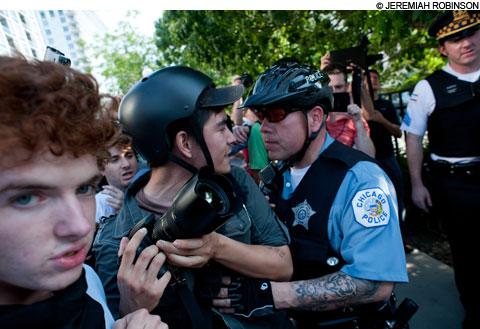
COPPING A FEEL A CPD officer hassles Boston-based independent photographer Paul Weiskel during
NATO protests in Chicago last month. |
As the Veterans for Peace led marchers into the mayhem of last month's NATO protest in Chicago, photographers and cameramen from major media outlets rode ahead of the pack on a double-decker bus. A few more enterprising mainstream journalists were brave enough to walk in the crowd — under the protection of uniformed security guards. And when shit finally went down that evening, most television crews retreated to rooftops on the edge of the chaos. Embedded they were not.
Since Occupy began, authorities nationwide have seemed eager to keep press at a distance. While reporters from large news organizations have mostly gone along with that, their less-well-paid nontraditional counterparts — bloggers, freelancers, livestreamers, and Twitterati — have been up close and elbow-deep, risking arrest or worse.
Josh Stearns of the media-reform nonprofit Free Press, which tracks journalist arrests, says the 2008 Republican National Convention set a new tone for the treatment of reporters. "This sort of thing was seen as an aberration," he says. "Now, though, every other week we learn about at least two more arrests. It's no longer an aberration — it's a trend, and it's an ongoing issue."
It's also a familiar issue for Netroots Nation veterans. Since 2008, the progressive conference and lefty blogger summit has given a voice to reporters who have been working on the front lines of protests. But things have worsened since Occupy erupted, with more than 80 journalists — from credentialed photographers to independent livestreamers — being detained on the beat.
While members of the alternative and independent media are more vulnerable, mainstream reporters are not immune; New York Times freelancer Natasha Lennard's arrest at the beginning of Occupy Wall Street drew loud criticism, and Chicago cops even nabbed a Getty photographer during the NATO protests. For reporters on both sides of the media divide, it's an escalating struggle just to chronicle the action without getting cuffed.
DIRECT ACTION
Veteran author and journalist Amy Goodman is an icon to those fighting for freedom of the press. The host and executive producer of Democracy Now! became a media martyr in 2008, when she was arrested at the RNC in St. Paul, Minnesota. Two of her producers, Sharif Abdel Kouddous and Nicole Salazar, had been bagged after tailing a destructive group of rogue protesters that broke off from a larger march; Salazar held onto her camera long enough to film police beating her bloody on the ground while she repeatedly screamed, "Press!" When Goodman arrived to confront the arresting officers, they placed her in plastic ties without explanation.
"Increasingly, the feeling is that everybody's the same out there," says Stearns, who adds that the arrests of about 50 reporters during the RNC protests set a toxic standard. "Since then, we've seen repeatedly at Occupy that police have even ignored press credentials in situations when protests are so violent that they wouldn't want people talking about it."